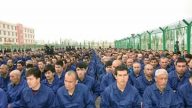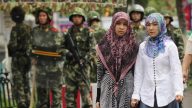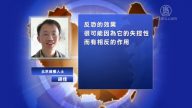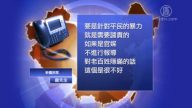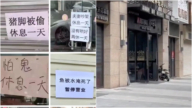【新唐人2013年07月06日讯】最近新疆吐鲁番以及和田爆发流血冲突事件之后,中共政治局常委俞正声及政法委书记孟建柱赶到新疆亲自“维稳”,展现中共对新疆维稳更加强硬的作风。北京“中央民族大学”维吾尔族学者伊力哈木.土赫提警告,中共当局一味的打压,只会形成新疆民族更强烈的反弹。他呼吁当局要调整政策,才不至于发展成一个民族的对抗。
7月5号是新疆乌鲁木齐七五事件4周年,每年这个时候,中共当局都会出动大批武警部队及装甲车加强巡逻。据人权组织透露,新疆多个政府部门电脑网路被切断,公务员电话、手机不能发放及接收短讯。而在乌鲁木齐市游客众多的国际大巴扎市集,一群武警手持枪械和盾牌、头戴钢盔在街头四处走动。
驻疆武警部队还举行了万名军警、百辆装甲的演习,同时,自治区公安厅发布通缉令、收缴刀具以及提供悬赏,加大对所谓可疑人士的打击力度。
北京中央民族大学副教授伊力哈木.土赫提(Ilham Tohti)则批评北京当局在他的家乡新疆,实施严厉的高压措施,并且煽动族群不和。
来自新疆,一向敢言并且倡议维护维吾尔族权益的土赫提,7月5号在维吾尔在线网站发表文章说,“我了解我的民族,这个民族是有梦想的,这个民族是有很强的历史文化、民族传统。他如果不被尊重的话,在这个开放的年代,一个互联网的时代,这个民族他可能会走向全面的对抗。”
虽然中共当局把6月底在吐鲁番与和田发生的事件,定义为所谓的暴力恐怖事件,但世界维吾尔人大会发言人迪里夏提则指责说,这是中共的高压政策导致的民众反抗。
时事评论员蓝述表示,新疆维族人面临的不只是中共的压迫,他们还要承受信仰和种族的被欺压,在这种情况下,维族人的反抗自然会比其他地区的汉族人民来的激烈。
时事评论员蓝述:“中共在新疆如果压制不住这种反抗的话,很可能其他省分的汉族人会以它为榜样,进行更大规模的反抗,这是中共最害怕的东西。所以说,中共派出大批的警力和军力,用宣传机器把这个少数民族的人民和中共之间的对立,把它说成了一个主权问题。”
蓝述认为,新疆维族人的要求被说成是主权问题,反抗说成恐怖行动,中共的目地是挑起族群对立,让内地一些不了解真相的民众,对新疆维族人产生仇恨。
同时,北京维权人士胡佳也表示,现在中国最主要的矛盾,是党民矛盾,是来自于这群手里握着刀把的共产党员对人民的压迫。而新疆事件,当局虽然加强了警力部署,但仍无法制止流血事件的发生,说明有越来越多的维吾尔人愿意冒生命危险,反抗中共的镇压。
胡佳:“这个矛盾,意识冲突,也许敢怒不敢言,但他不敢言的时候,并不代表他心里没有这种怒火。如果不走民主化的话,中国就是这一党专政的情况下,只会陷入恐怖和暴力,只会采取镇压的形式让民族矛盾越来越激烈,越来越血腥。”
2009年7月5号,新疆乌鲁木齐市发生了大规模的流血冲突事件,官方公开的数字表示,在冲突中有197人死亡,1721人受伤。由于事发后,中共立即封锁了消息,所以真实死亡人数至今仍然是个谜。
采访/易如 编辑/黄亿美 后制/郭敬
Scholar criticized the Chinese Communist Party’s “suppression-only” policy in Xinjiang
Last week two violent clashes broke out in Turpan and
Hotan, Xinjiang province.
After that, the Chinese Communist Party (CCP) politburo
standing committee member Yu Zhengsheng and secretary
of Politics and Law Commission Meng Jianzhu went there
to command the “stability maintenance battle” in person.
This indicates a tougher attitude of the Party toward
Xinjiang’s ethnic issue.
Ilham Tohti, a Uyghur scholar at Minzu University of China
in Beijing, warned that CCP suppression will only result in
stronger resistance from the Uyghur people.
Tohti called on the CCP leaders to change its policy to
avoid antagonizing the whole ethnic group.
July 5th is the 4th anniversary of the July Ürümqi Riots in 2009.
Every year around this time, the CCP sends out many armed
police and armored vehicles to tighten its control over Xinjiang.
According to some human rights organization, the Internet
of many governmental agencies had been cut off.
Mobile phones of governmental employees also stopped
sending or receiving messages.
At Ürümqi’s Xinjiang International Grand Bazaar, armed
police with firearms, shields and helmets patrol the streets.
The Xinjiang Armed Police Force also held a drill with
thousands of police and hundreds of vehicles.
In the meantime, the provincial public security department
issued an order for collecting knives from local residents.
It also offered awards for information of “suspicious
individuals” as part of a firmer crackdown.
Ilham Tohti, criticized the CCP for applying the coercion policy
in his home province and making conflicts among ethnic groups.
Tohti, a Uyghur, is famous for his courage of publicly
speaking out for Uyghur people’s rights.
On July 5th, He published an article on the website
Uyghur Online (uighurbiz.net).
Tohti wrote that: “I know our people very well.
This is a group with their own dream and strong feelings
of ethnic culture and historical tradition.
If given no respect, the Uyghur people may fight back in
every aspect in this open age of the Internet.”
The CCP defined the June clashes in Turpan
and Hotan as “terrorist incidents”.
As a rebuttal, Dilshat Reshit of the World Uyghur Congress
said the clashes were Uyghur peoples’ resistance
against the CCP’s coercion policy.
Political commentator Lan Shu remarked that,
the Uyghur people were suppressed by the CCP not only
in politics, but also in religion and ethnicity.
In such a situation, their resistance is certainly stronger
than that of other Han Chinese.
Lan Shu: ”If the CCP fails to crack down on the Uyghur people,
probably other Han Chinese will follow and resist in even larger scales.
This is why the CCP is so afraid. That’s why it sends out large
numbers of police and troops to the suppression.
At the same time, the propaganda department works hard
distorting conflicts between minority ethnic groups
and the CCP into a ‘sovereignty issue’.”
Lan Shu said, by describing Uyghur people’s requests
as a “sovereignty issue”,
and labeling their resistance as a “terrorist attack”,
the CCP tried to generate fights between ethnic groups.
Especially for Chinese who live in other places, they can easily hold
hostility against the Uyghur people without knowing the truth.
Beijing human rights activist Hu Jia said that, currently China’s
most important conflict is between the CCP and civilians.
This results from violent suppressions of the party
members against ordinary people.
This time the bloodshed clashes in Xinjiang happened
under an intensified control by the CCP police.
This indicated that more Uyghur people are becoming
willing to resist the party at the cost of their lives.
Hu Jia: ”Suppression may not lead to immediate resistance.
Sometimes people dare not to speak it out loud.
However, this does not mean that
there is no grudge in their minds.
If the current dictatorship regime continues in China
without any democratic progress,
we will only see more terror and violence in the future.
The suppression-only policy will only lead to worse ethnic
problems and more violent resistance.”
On July 5th, 2009, massive violent riots broke out in Ürümqi,
the capital city of the Xinjiang.
It was officially announced that 197 were killed and
1721 were injured during the clashes.
However, as the CCP immediately started a news
blackout after the incident.
The real number deaths remain unknown to the world.


